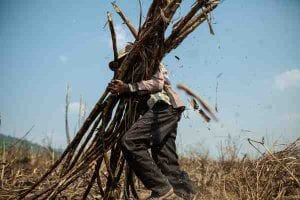At the start of the Annual World Bank Conference on Land and Poverty this week, World Bank President Dr. Jim Kim made some welcome remarks about the global land rights crisis. He did not respond directly to the withering criticism of the role the Bank has played in promoting land grabs. But he did say that the Bank shares the concerns about the risks of large-scale land acquisitions, and importantly he acknowledged that “additional efforts must be made to build capacity and safeguards related to land rights and to empower civil society to hold governments accountable.”
What caught people at the Conference pleasantly off guard was the Bank’s statement that its own social and environmental safeguard policies, now under review, would be informed by the Voluntary Guidelines on the Responsible Governance of Tenure of Land, Forest and Fisheries.
Inclusive Development International and Oxfam put forward a concrete proposal at the Conference for the Bank to do just that. We presented a proposal for a new World Bank safeguard policy on tenure of land, housing and natural resources that draws extensively from the Voluntary Guidelines.
The proposal addresses major gaps in the Bank’s current policy framework that have left people affected by Bank operations unprotected from harmful impacts on their tenure rights. If adopted, these policy measures would ensure that the Bank upholds its responsibility to respect human rights by safeguarding against the weakening of tenure rights, the instigation of land conflict and the exacerbation of inequality in access to land and natural resources by Bank operations. In line with the Bank’s stated intention to “do good” with its next generation of safeguards, they would also require Bank-assisted land projects to be designed in a manner that strengthens, secures and prioritizes the tenure rights of vulnerable and marginalized people, and promotes more equitable access to land, housing and natural resources, with particular attention to the rights of women.
Our proposed safeguards are predicated on the presumption that people using land and natural resources for their basic needs have valid tenure rights that must be respected. We propose a number of measures to confer legal security across the continuum of tenure forms, whatever they may be in the given context. The adoption of these safeguards would represent an explicit acknowledgement by the Bank that secure tenure is not a one-size-fits-all concept. Tenure security is not synonymous with registered private ownership and individual freehold is not the only legitimate or even the most appropriate form of tenure in every context. This recognizes that different forms of tenure – freehold, leasehold, access rights, herders rights, customary rights, indigenous people’s rights – are all legitimate tenure forms that need to be legally secured, and priority must be given to securing the rights of the most vulnerable groups. That includes women, who are often the most marginalized of all when it comes to secure access to land and housing due to entrenched discrimination in land governance systems. Under our proposal, when particular tenure rights cannot be secured for legitimate general welfare reasons, the Bank’s Involuntary Resettlement policy must be invoked to protect people against the harms of displacement, including statutory takings and potential future displacement.
The other main theme of the safeguards relates to agriculture development projects. We are calling for special safeguards for small-scale food producers and others with land-based livelihoods. These communities should be the primary beneficiaries of investments in agricultural development based on their free, prior and informed consent. In addition to outlining a number of measures to protect land-users in the context of such investments, the proposed safeguards would preclude the Bank from supporting investments that reduce the availability of productive land and natural resources for small-scale food producers and pastoralists to the detriment of their welfare and national food security.
Land grabbing and tenure insecurity have become the central threats to the lives and livelihoods of millions of people around the world today. Inequality in the control over land and natural resources is rising at an alarming pace. The new safeguards we have proposed, on their own, can only go so far in addressing this crisis. There needs to be a fundamental shift in the prevailing development model that encourages economic growth through the commodification and privatization of land and natural resources and the promotion of large-scale investment in industrial agriculture at all costs. The record shows that this model overwhelmingly favors the interests of political and economic power holders usually at the expense of poor and marginalized people.
The adoption of new safeguards that protect and promote poor people’s rights to land, housing and natural resources, would however force the Bank to change the way it approaches land and agricultural investments. This would have direct and immediate positive impacts for Bank-financed projects and the potential for catalytic effects on the governance of tenure globally.
It is easy for the Bank to express its support for the Voluntary Guidelines. It is quite another for it to make the Guidelines the minimum standards for Bank operations that impact on tenure, including the advice that it gives its borrowers. The only way to achieve that is to integrate the Guidelines into binding World Bank operational policies. The safeguards review presents a once-in-a-decade opportunity for the Bank to demonstrate leadership in stemming the global land rights crisis and put some teeth behind the President’s statement.
First posted on Terra Nullius.


